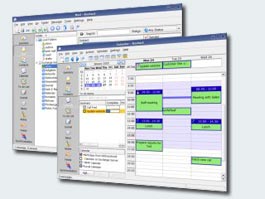Kontact
 |
Kontact je integrovaný správce osobních údajů pro KDE |
Kontact sjednocuje vyspělé a ověřené KDE aplikace pro správu osobních údajů pod jednu střechu. Díky výkonné KPart technologii jsou tyto aplikace dokonale sjednoceny do jednoho celku.
KDE Kontact consists of the Kontact PIM back end and the graphical applications connecting to the back end. Special 'agents' (say a facebook agent) are employed to get new data in and merge it in the existing data set (for example contacts, news). Due to the clean infrastructure new agents are easy to develop.
Kontact supports various groupware servers. When using these servers your workgroup has access to features like shared email folders, group task lists, calendar sharing, central address books and meeting scheduling.
Ve zkratce: KDE Kontact přináší inovace, které Vám pomohou snadněji spravovat Vaši komunikaci, organizovat rychleji Vaši práci a dovolí Vám užší spoupráci s ostatními což vede ke zvýšení produktivity a efektivity při digitální spolupráci.
Komponenty
Tyto programy mohou být integrovány do aplikace Kontact:
- Akregator - Přečtěte si Vaše oblíbené kanály
- KAddressBook - Spravujte své kontakty
- KJots - Organizujte své nápady
- KMail - Emailový klient
- KNode - Vaše usenet emailová čtečka
- KNotes - Poznámky na Vaši pracovní plochu
- KOrganizer - Kalendář a plánování, deník
- KTimeTracker - Sledujte kolik času trávíte jednotlivými úkoly
- Summary - Všobecný přehled v Kontactu
Viz také
- How to send SMS using Kontact
- Port to touch screen devices (like mobile handsets or tablets) (currently maemo/Windows Mobile/MeeGo)
Working with Google Data
- Working with GMail - Read your GMail in KMail
- Working with Google Calendar - Integrate Google Calendar with KOrganizer.
- Working with Google Contacts - Allow Google Contacts to synchronize with Kontact
Kde získat pomoc
There is a mailing list at
- kdepim-users - for users of the KDE PIM applications (Kontact, KAddressBook, KMail, KOrganizer, KNode, ...) subscribe to kdepim-users archive of kdepim-users. A team of developers and users aim to give answers as quickly as possible
and for urgent help, an IRC channel on Freenode
- for users and developers of Kontact - #kontact
Akonadi and KAddressBook
If you have problems concerning Akonadi and the new KAddressBook, there are pages dedicated to these issues
FAQ, Hints and Tips
Migrating your setup to a new distro
In KMail, right click on your Inbox and choose Properties. Go the Maintenance Tab. Have a look at the Location. It has either .kde4 or .kde in the path.
Substitute the appropriate path below.
You need the following config files:
- .kde4/share/config/emaildefaults
- .kde4/share/config/emailidentities
- .kde4/share/config/kmail.eventsrc
- .kde4/share/config/kmailrc
- .kde4/share/config/kaddressbookrc
- .kde4/share/config/kresources/contact
- .kde4/share/config/korgacrc
- .kde4/share/config/korganizerrc
- .kde4/share/config/knotesrc
- .kde4/share/config/mailtransports
And the following directories:
- .kde4/share/apps/kmail
- .kde4/share/apps/kabc
- .kde4/share/apps/korganizer
- .kde4/share/apps/knotes
If you use Akregator within Kontact, you will also need:
- .kde4/share/config/akregator.eventsrc
- .kde4/share/config/akregatorrc
And the whole .kde4/share/apps/akregator directory.
Of course the simplest way is just to keep your whole home directory.
Just a word of warning. If the directory naming is different between Desktops or between the two versions of your distro, this will not work as there are references to the directories within the config files. This means that if the files were in a .kde directory, you cannot just put them in a .kde4 directory without editing the references within the config files.
Hiding the Kontact Sidebar
On small screens, you may wish to reclaim the space used by the Kontact sidebar. You can replace it with an (editable) toolbar:
- Drag the left panel closed using the splitter between it and the main panel, job done. Don't forget to enable Navigator in every component.
Enabling SOCKS support in KMail and KNode
Unlike KDE 3, KDE 4 does not have built-in SOCKS support yet. However, it is still possible and relatively simple to make KMail and KNode use a SOCKS proxy, by using proxychains or other similar tools like tsocks or socksify. Assuming that proxychains is correctly installed and configured, all you need to do is to open a terminal (e.g. Konsole) and type:
proxychains kdeinit4
You don't even need to restart KMail/KNode! (You need to type the above command every time you start a new KDE session though).
